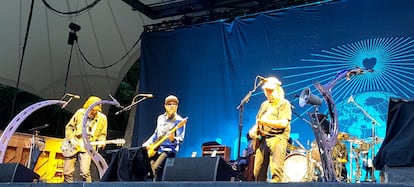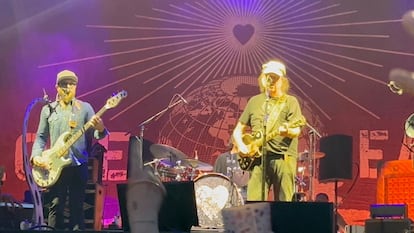Neil Young, the shaman, and his great rock and roll challenge

When night had engulfed the impressive Waldbühne theater in the middle of the Berlin woods like a deep, distant dream, free of the world's failings, there was one detail that illustrated Neil Young well, more than a great musician, as a shaman invoking the supernatural forces of an alternative energy on the verge of extinction, but not yet extinguished, called rock and roll . The string of his guitar broke during the deranged performance of 'Rockin' in the Free World' and Young, with that decomposed smile halfway between earth and sky, stared in a trance at that string with such intensity and for so long that he seemed possessed by something that has no name. He and his band were setting fire to the stars with their wild guitars during the more than ten minutes of one of the most emblematic anthems of countercultural rock, and the broken string danced on the neck, desperate and frantic. Young looked at her and moved in semicircles, accompanying her dance, continuing to squeeze out the sound as if it were Judgment Day.
It wasn't Judgment Day, but this world has become a place that often seems to be hurtling toward it. And if it doesn't hurtle toward it, it has been transformed into a space so different from the one dreamed of that every day it is a little more conquered by the creators of nightmares. A world surrendered or narcotized, it almost makes no difference, in the face of the unstoppable advance of abusers, intolerants, and barbarians, different species for the same legion of destroyers of equality, fraternity, and solidarity. The leader of that world who stands tall and feels strong today is Donald Trump, whom Neil Young decided to stand up to before any other musician when he said that he was "the worst president in the history of the United States," that he had "kidnapped the country with his persecutions," and because of whom he believed that perhaps he, a Canadian with American nationality, would not be allowed to enter the United States. Bruce Springsteen also criticized Trump , and Young immediately came out in support of his colleague in the face of the White House leader's insults and threats. "Bruce, you are not alone. Trump, we are not afraid of you," Young wrote on his website.
Neil Young's rock and roll is a challenge in itself. Such an overwhelming discharge of electricity that it leaves no one indifferent, much less live, when this shaman, known in intimate music circles as Crazy Horse, seeks to transcend with his craft, with his vocation, with his philosophy of life. The philosophy of countercultural rock, that independent republic of combative ideas against power, born in the 1960s. And the counterculture, however utopian, however innocent, however illusory it seemed, was always that alternative current that could strike lucid sparks in restless minds, free spirits, committed people.
Neil Young's challenge is to continue reclaiming the stage as what it always was: a meeting place, but, in his case, under the invocation of the flame of rock and roll. If the world seems a little more surrendered or narcotized every day, where the counterculture is relegated to a Netflix documentary, he isn't. Neither surrendered nor narcotized. What's more, he's willing to establish himself as the last of the Mohicans in whom we believe and the most capable of promoting any challenge, no matter how difficult.

With his tousled grayish locks sticking out of his cap and his white sideburns like two Indian marks from a primitive world, this old-school troubadour, a traveler of a thousand battles at 79 years old, took to the stage at the Waldbühne last Thursday with a slight limp and a slightly cracked voice as he launched into "Ambulance Blues," a hidden gem from his immense songbook. It was 8:00 p.m. and still daylight in the Berlin summer when this halftime performance plunged the 23,000 spectators into a kind of reverie, a transit toward the imaginary territory to which he wanted to take everyone present. A territory built with the power of delirium.
Delirium, the space where hallucinations are conceived, where the impossible is possible, where the chimera has a reason to exist and beats in the heart. The space of shamans. By the second song, they were already beginning their journey with "Hey Hey, My My (Into the Black)," another of Young's anthems where the guitars take center stage, like soldiers about to land in Normandy. Music as a proclamation. A way of knowing oneself in the world, of seeking representation, of associating through sounds. "There's more to the picture than meets the eye," Young sang unbridled, only five minutes into the concert. " Rock and roll will never die," he continued proclaiming under the electric curtains that demanded the listener's commitment. "It's better to burn out than to go out slowly," he bellowed, now full of voice, in the song's most famous verse, the rallying cry of his philosophy.
This cry was amplified with a mind-blowing barrage: "Be the Rain," "When You Dance, I Can Really Love," "Cinnamon Girl," and "Fuckin' Up," compositions bearing all the hallmarks of the indomitable great of rock. He sang it with unbridled, unnatural energy. The mystery seemed to lie in the absorbing tension of his guitars. As if he were posing the same dilemma of existence in the face of an uncertain and conflicting world: take sides, don't stay still, don't fall asleep, don't let yourself be drugged, don't give up. Passages of ferocious and frenzied guitars seemed to push us to reclaim our place in the world. Young went wild alongside the guitar of Micah Nelson, son of Willie Nelson, and the bass of Corey McCormick, two superb squires from The Promise of Real, the band that accompanied him on that devastating tour that brought him to Spain for the last time in 2017 and who today are part of Chrome Hearts, Young's backing group that also includes Spooner Oldham on organ, a legend of the Muscle Shoals sound, behind the eternal soul of Aretha Franklin or Wilson Pickett.
Now, unlike in 2017, the concerts are shorter, but one could say more intense. Or, perhaps, more spiritual. More shamanic. Since time immemorial, shamans have always had the ability to change reality or collective perception thanks to their knowledge beyond the logic of earthly life. Young has spent decades devoted to this pagan religion of rock and roll, where human energies come into contact with mystical or illusory yearnings. Rock's approach was always simple, but an entire banal entertainment system tried to make us believe it was something outdated, just as perhaps some foolish person believed black and white films or books were obsolete. The approach is the conjunction of guitars, drums, harmonica, organ, and the awareness that this sonorous and urgent vehicle always sought to crash into shop windows, into preconceived ideas, into political correctness, and, let's say it loudly in these confusing and strange times, into abusers. Rock and roll, as Young so aptly demonstrated in Berlin with his appearance of an old man who has fled the nursing home and is about to be locked up, is a strong statement, fearless, unhindered, full of spirit.

When you saw him blowing the harmonica on 'The Needle and the Damage Done', 'Southern Man' or 'Harvest Moon', or when you felt him turning the stage into a sacrosanct place of improvisation and contained chaos in 'Love to Burn' or, above all, 'Like a Hurricane', breaking the boundaries of what many call a show , of what would be a simple spectacle nominated for a Grammy, the listener, who couldn't be guided by the screens when they were off, but by unbridled sounds, could understand that the best rock is a blast of alternating electricity ready to dynamite an environment. Sometimes, you are what you bill, quote, or a piece of paper tells you to be. But Young, like Bob Dylan, Bruce Springsteen, Patti Smith and a few others of his kind, has also been able to remember that, sometimes, you are something more: a human being who can search beyond the margins, who can find himself outside the system, and who can silently shout above his possibilities. A person who knows that they can't just be what they're told to be.
“This place is incredible,” the musician repeated at various points during the performance. The Waldbühne is a wonderful place where music takes on a more sacred connotation. There was a moment when the melancholic melody of “Name of Love,” with its interplay of voices reminiscent of the original by Crosby, Stills, Nash, and Young, left the coliseum in ceremonial silence. The trees surrounding the theater, where the Rolling Stones, Pearl Jam, and contemporary classical music had once played, were calm, like all the thousands of souls they sheltered. And that was a space reduced to a prayer. It wasn't the only one: “Old Man” was also featured, with that acoustic guitar, with Young illuminated by the orange spotlight, with the night falling like a blanket covering the madmen. It sounded tender, very innocent, as if it were the first time it had been heard in the history of folk. And in all that delicacy, it was understood that the best songs don't need technological firecrackers to make noise inside people.
Noise, storms, decibels, delirium, and broken strings. The concert's only encore was "Rockin' in the Free World," the great invocation of the rock and roll shaman. Before launching into it, he said, "We all know where we are, and it's good to feel here, at this concert. The world is a crazy place right now, so we should all look out for each other everywhere." And then he remained in a trance with the broken string. Three days earlier, referring to the concert he had given in Brussels, Young wrote in his newsletter to his fans that during that performance, he noticed a butterfly flying freely and wildly on the stage, between him and Corey McCormick as they brandished their guitars during one of their songs. It danced as if propelled by electricity, and, he said, he, Neil Young, during those seconds, felt that its flight enhanced the experience of his music performed live. A butterfly or a broken string. Perhaps a minor detail, but in every little detail we may be playing not only the future, but the present. Entering into a trance with 'Like a Hurricane' or 'Rockin' in the Free World' was understanding that we had better feel like hurricanes or immeasurable fires, as the delirious guitar of shaman Neil Young called it, to defy the evil disguised as salvation.
EL PAÍS


%3Aformat(jpg)%3Aquality(99)%3Awatermark(f.elconfidencial.com%2Ffile%2Fbae%2Feea%2Ffde%2Fbaeeeafde1b3229287b0c008f7602058.png%2C0%2C275%2C1)%2Ff.elconfidencial.com%2Foriginal%2Fe49%2F4b6%2Fe66%2Fe494b6e66dabf02bdc3ff11e18ee954b.jpg&w=1280&q=100)


